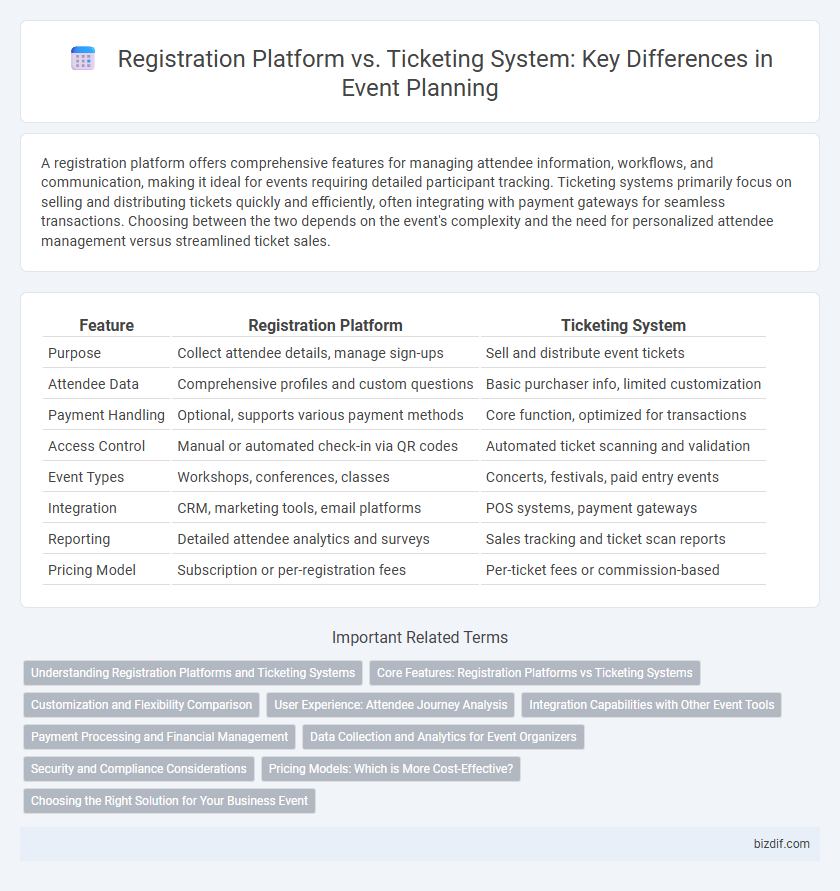A registration platform offers comprehensive features for managing attendee information, workflows, and communication, making it ideal for events requiring detailed participant tracking. Ticketing systems primarily focus on selling and distributing tickets quickly and efficiently, often integrating with payment gateways for seamless transactions. Choosing between the two depends on the event's complexity and the need for personalized attendee management versus streamlined ticket sales.
Table of Comparison
| Feature | Registration Platform | Ticketing System |
|---|---|---|
| Purpose | Collect attendee details, manage sign-ups | Sell and distribute event tickets |
| Attendee Data | Comprehensive profiles and custom questions | Basic purchaser info, limited customization |
| Payment Handling | Optional, supports various payment methods | Core function, optimized for transactions |
| Access Control | Manual or automated check-in via QR codes | Automated ticket scanning and validation |
| Event Types | Workshops, conferences, classes | Concerts, festivals, paid entry events |
| Integration | CRM, marketing tools, email platforms | POS systems, payment gateways |
| Reporting | Detailed attendee analytics and surveys | Sales tracking and ticket scan reports |
| Pricing Model | Subscription or per-registration fees | Per-ticket fees or commission-based |
Understanding Registration Platforms and Ticketing Systems
Registration platforms streamline the event sign-up process by collecting attendee information, managing participant lists, and handling customized registration forms, which enhances data organization and communication. Ticketing systems focus on selling, distributing, and validating tickets, providing features like payment processing, barcode scanning, and real-time sales tracking to ensure secure access control. Understanding the distinct roles of these tools helps event planners optimize attendee management and improve the overall event experience.
Core Features: Registration Platforms vs Ticketing Systems
Registration platforms offer advanced attendee management, custom form creation, and seamless data integration for event organizers. Ticketing systems specialize in secure payment processing, real-time ticket sales tracking, and automated ticket delivery. Both tools enhance event planning but serve distinct purposes tailored to registration data management or transactional ticket sales.
Customization and Flexibility Comparison
Registration platforms offer extensive customization options, allowing event organizers to tailor attendee information fields, branding, and user experience to specific event requirements. Ticketing systems prioritize streamlined ticket sales but often have limited flexibility in customizing registration forms or workflows. For complex events requiring personalized data collection and adaptable registration processes, registration platforms provide superior flexibility compared to standard ticketing solutions.
User Experience: Attendee Journey Analysis
A registration platform streamlines the attendee journey by offering personalized forms, seamless data collection, and easy profile management, enhancing user satisfaction and engagement. Ticketing systems prioritize quick purchase and entry verification, focusing on transaction speed but often lacking customization options and detailed attendee insights. Optimizing user experience requires balancing comprehensive registration features with efficient ticket handling to ensure a smooth, end-to-end event participation process.
Integration Capabilities with Other Event Tools
Registration platforms offer extensive integration capabilities with CRM, marketing automation, and attendee engagement tools, ensuring seamless data synchronization and enhanced event management. Ticketing systems often provide robust connections to payment gateways and access control solutions, facilitating smooth ticket sales and entry processes. Selecting a solution depends on the event's complexity and the need for comprehensive tool interoperability to optimize attendee experience and operational efficiency.
Payment Processing and Financial Management
A registration platform typically offers comprehensive payment processing features including invoicing, multiple payment methods, and integrated financial reporting, making it ideal for managing complex event budgets and tracking cash flow. Ticketing systems focus primarily on secure payment transactions and real-time sales data but may lack advanced financial tools such as expense tracking or customizable billing. Choosing the right solution depends on the event size and financial management needs, with registration platforms providing greater control over payment reconciliation and accounting integration.
Data Collection and Analytics for Event Organizers
Registration platforms offer comprehensive data collection features, enabling event organizers to capture detailed attendee information such as demographics, preferences, and engagement patterns. Ticketing systems primarily focus on sales transactions and may lack advanced analytics capabilities for tracking attendee behavior and post-event insights. Leveraging registration platforms enhances data-driven decision-making by providing deeper analytics, improving event personalization and marketing strategies.
Security and Compliance Considerations
A registration platform offers enhanced security features such as encrypted data storage and compliance with GDPR and PCI DSS standards to protect attendee information throughout the event lifecycle. Ticketing systems primarily focus on secure payment processing and fraud prevention, integrating multi-factor authentication and real-time transaction monitoring to safeguard financial data. Choosing between the two depends on the specific security requirements, with registration platforms providing broader compliance capabilities beyond ticket sales.
Pricing Models: Which is More Cost-Effective?
Registration platforms often charge a flat fee or a monthly subscription, providing unlimited registrations suitable for large-scale events, while ticketing systems typically implement a pay-per-ticket model that may increase costs proportionally with attendance. For budget-conscious event organizers, registration platforms can be more cost-effective for events with high or unpredictable turnout due to predictable expenses, whereas ticketing systems offer financial flexibility for smaller events with lower attendance. Evaluating expected guest numbers and event duration is essential to determine which pricing model optimizes overall event budget efficiency.
Choosing the Right Solution for Your Business Event
Selecting the optimal registration platform or ticketing system hinges on the event's scale and specific business needs, with registration platforms offering comprehensive attendee management and data analytics, while ticketing systems excel in streamlined ticket sales and entry control. Businesses hosting conferences or workshops benefit from registration platforms due to their robust customization and integration options, enhancing participant engagement and operational efficiency. For events prioritizing quick ticket distribution and real-time sales tracking, ticketing systems provide a user-friendly solution that supports scalability and seamless payment processing.
Registration platform vs ticketing system Infographic

 bizdif.com
bizdif.com